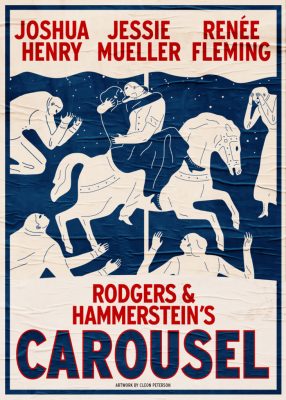Carousel in a #MeToo Moment
“Carousel,” starring Jessie Mueller, Josh Henry and Renee Flemming, is now in previews with an official opening night set for Thursday, April 12. (Photo courtesy of DKC/O&M)
March 20, 2018
Jessie Mueller is a vocal chameleon. For her 2014 transformation into Carole King in the award-winning broadway musical, “Beautiful: The Carole King Musical,” Mueller took home a Tony Award for Best Lead Actress in a Musical; for her metamorphosis into a soaring 1940s jazz singer in “On A Clear Day You Can See Forever,” she received a featured actress nomination. In “The Mystery of Edwin Drood,” Mueller transformed once again — this time into an accent-thick Helena Landless — and in her turn as Cinderella in The Public Theater’s 2012 summer production of “Into The Woods,” her voice fluttered with the levity and the thrill of a soon-to-be princess.
But this Spring, Jessie Mueller is tasked with a different sort of transformation, one arguably more difficult, even for a seasoned actress. Under the direction of three-time Tony Award winning director Jack O’Brien and veteran producer Scott Rudin, Mueller must palatalize and reconstruct in some way the role of Julie Jordan, a character who is victimized by an abusive marriage, yet written to excuse at every turn the actions of her victimizer, in a revival of Rodger and Hammerstein’s classic, “Carousel.”
If you’ve seen the movie or sat through a performance, you remember the line. “It is possible dear — for someone to hit you —to hit you hard — and not hurt at all,” Julie says to her young daughter, Louise, soon after the teenager is visited by a spector of her dead father and is struck by him while trying to flee. Delivered by Julie with a smile of remembrance and love toward her late, abusive spouse, the line has presented a daunting challenge for many an actor and director. For audiences, it bears a sobering, puzzling end to Rodger and Hammerstein’s dark foray into love and abuse.
When the 2018 revival of “Carousel” opens in April, Mueller will deliver the infamous line on a stage set before a nation that has been rattled by the evils of sexual assault and harassment, awakened to its frequency and commonplace.
In the midst of a #MeToo movement, how will the new production navigate these volatile waters?
Set on the coast of Maine in 1945, “Carousel” tells the story of a carnival-worker named Billy Bigelow, whose (some would say coerced) romance with millworker Julie Jordan is stressed by Billy’s violence, domestic abuse and inability to make ends for his family. When the show opened in 1945, Rodgers and Hammerstein, who adapted the story from Ferenc Molnár’s 1909 play “Liliom,” received nearly unanimous high praise. “Richard Rodgers and Oscar Hammerstein II, who can do no wrong, have continued doing no wrong,” wrote the New York Times’ theater critic, Lewis Nichols.
But in 2018, to read and to experience Hammerstein’s script, its characters so heavily imbued with archaic and dangerous notions of domestic abuse, of a woman’s duty to forgive and to forget her husband’s violence, of our duty to turn a cheek to abuse, to look beyond it and to blame those who are assaulted, is excruciating.
When Billy first meets Julie on his carousel, he flirts with her and puts his arm around her waist; when Julie leaves the fair, she is chased by the carousel’s owner, Mrs. Mullin, and told to never return. “I don’t run my business for a lot o’ chippies,” says Mrs. Mullin. (In the acclaimed 1956 movie adaption, “chippies” is revised to “sluts”). In a celebrated song from the show, “If I Loved You,” Julie sings to Billy, “If I loved you, I’d let my golden chances pass me by,” and in another highly remembered song, “What’s The Use of Wond’rin?,” Julie sings: “What’s the use of wond’rin if he’s good or if he’s bad…he’s your fella and you love him. There’s nothing else to say.” And in the end, Julie is written to excuse all that Billy has done by uttering her infamous line. “Honest there was a strange man here and he hit me, hard…but it didn’t hurt, Mother! It was just as if he kissed me,” says Louise to Julie just before it’s spoken.
The current movement of silence-breaking against sexual abusers and assaulters in positions of power, beginning in Hollywood with a New York Times exposé of allegations against film mogul Harvey Weinstein, has yet to make a significant mark on Broadway. How Jack O’Brien and Scott Rudin treat “Carousel,” how they and their actors choose to render Hammerstein’s script, may very well set the tone for Broadway’s reckoning with the treatment of women in the workplace.
When “Carousel” made its acclaimed (and fourth) revival in 1994, winning five Tony Awards including Best Revival of a Musical, discussion of Rodger and Hammerstein’s handling of domestic abuse was absent. In his official New York Times review, David Richard described “What’s The Use of Wond’rin?,” a song that seen through contemporary eyes would appear to be a blatant excusal of abuse, as “Julie’s attempt to explain the unexplainable bond between [her and Billy]” and as “the sweetest surrender to fate ever penned,” Julie described as “attracted to danger” and as suffering domestic abuse with a “helpless fortitude.”
But today Broadway must reckon with the realities of abuse, inside the workplace and out. Today, the nation is spinning toward justice, towards understanding for those who experience assault.
Will “Carousel” turn just the same?











Cassidy • Mar 20, 2018 at 6:17 pm
They actually cut the line about a hit feeling like a kiss and have Julie Jordan say “Shhh” to her daughter. I saw it in previews. It’s a troubling, but relatable story with gorgeous music. I’d see the show before you jump to conclusions!